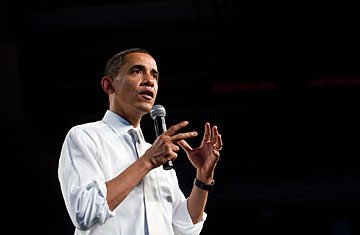
U.S. President Barack Obama addresses a town-hall meeting on health care at Shaker Heights High School in Shaker Heights, Ohio, outside Cleveland
Since he took office in January, President Barack Obama has made clear that he views this year as the best opportunity in decades to overhaul the nation's ailing health-care system; more recently, he has stressed that he wants the House and Senate to pass their respective bills before their monthlong August recess. That, to say the least, is not going according to plan. The Senate said on July 23 it would not make the deadline, and the House is also looking increasingly unlikely to produce a bill by then. This slows the momentum behind the President's top priority, giving opponents extra time to sow doubts in both politicians and the public. But it also raises the question: Why can't a popular President with poll numbers in the 60s and supermajorities in both chambers of Congress get this done? Here are the five biggest hurdles to health-care reform.
1. Curbing Costs
The top goal of health-care reform for Democrats on either end of Pennsylvania Avenue has been to bring down the long-term health-care costs for the government, companies and individuals. It's the overriding justification for attempting such an ambitious overhaul while the economy is in such dire straits and the federal budget deficit is skyrocketing.
Two weeks ago, the Congressional Budget Office found that neither the bill produced in the House nor the one written by the Senate Health, Education, Labor and Pensions (HELP) Committee — Ted Kennedy's panel — would yield savings in the long run. On the contrary, Democrats on Capitol Hill are having a hard time coming up with ways to keep reform from raising the cost of health care over the next decade. This has given lots of ammunition to both Republican and fiscally conservative Democratic critics of the health-care proposals. And it puts a lot of pressure on the Senate Finance Committee — the last Senate committee dealing with health-care reform, and the one long expected to generate some bipartisan support — to produce some tangible cost-cutting. The negotiators — three Democrats (Senate Finance Committee Chairman Max Baucus of Montana, Senate Budget Committee Chairman Kent Conrad of North Dakota and Senate Energy Committee Chairman Jeff Bingaman of New Mexico) and three Republicans (top Finance Republican Chuck Grassley of Iowa, top HELP Republican Mike Enzi of Wyoming and Olympia Snowe of Maine) — are weeks behind schedule and are rushing to finish a bill before recess. But even if they're successful, the leadership would still need time to marry the HELP and finance bills together plus at least two weeks of floor debate before they could pass a final version — a process now bumped until September at the earliest.
Several different avenues for cost-cutting have been explored, including preventing fraudulent claims in Medicare and Medicaid and cutting programs and services that aren't deemed cost-effective. But one of the most recently touted potential methods, the creation of an independent board to take away from Congress the job of overseeing the rates of Medicare payments, took a hit late last week when the CBO estimated it would save only $2 billion over 10 years. The CBO acknowledged that the savings could turn out to be higher in the long run, but that qualifier highlighted one of the biggest problems for health-care-reform backers: the potential cost savings of overhauling the entire health-care system are unknown and impossible to predict with any accuracy. The CBO, for instance, has no real way to determine how much investments in prevention might save down the line.
